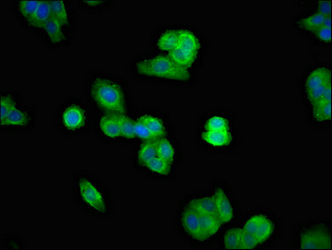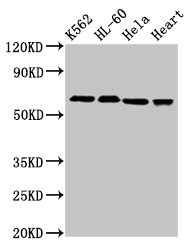Full Product Name
Rabbit anti-Homo sapiens (Human) UBASH3A Polyclonal antibody
Alternative Names
Cbl interacting protein 4 antibody; Cbl-interacting protein 4 antibody; CLIP4 antibody; STS 2 antibody; STS-2 antibody; Suppressor of T cell receptor signaling 2 antibody; Suppressor of T-cell receptor signaling 2 antibody; T cell ubiquitin ligand antibody; T cell ubiquitin ligand protein antibody; T-cell ubiquitin ligand 1 antibody; TULA antibody; TULA-1 antibody; UBASH3A antibody; ubiquitin associated and SH3 domain containing, A antibody; Ubiquitin-associated and SH3 domain-containing protein A antibody; UBS3A_HUMAN antibody
Immunogen
Recombinant Human Ubiquitin-associated and SH3 domain-containing protein A protein (287-455AA)
Immunogen Species
Homo sapiens (Human)
Conjugate
Non-conjugated
The UBASH3A Antibody (Product code: CSB-PA025427LA01HU) is Non-conjugated. For UBASH3A Antibody with conjugates, please check the following table.
Available Conjugates
| Conjugate |
Product Code |
Product Name |
Application |
| HRP |
CSB-PA025427LB01HU |
UBASH3A Antibody, HRP conjugated |
ELISA |
| FITC |
CSB-PA025427LC01HU |
UBASH3A Antibody, FITC conjugated |
|
| Biotin |
CSB-PA025427LD01HU |
UBASH3A Antibody, Biotin conjugated |
ELISA |
Purification Method
>95%, Protein G purified
Concentration
It differs from different batches. Please contact us to confirm it.
Buffer
Preservative: 0.03% Proclin 300
Constituents: 50% Glycerol, 0.01M PBS, pH 7.4
Tested Applications
ELISA, WB, IF
Recommended Dilution
| Application |
Recommended Dilution |
| WB |
1:500-1:5000 |
| IF |
1:50-1:200 |
Storage
Upon receipt, store at -20°C or -80°C. Avoid repeated freeze.
Lead Time
Basically, we can dispatch the products out in 1-3 working days after receiving your orders. Delivery time maybe differs from different purchasing way or location, please kindly consult your local distributors for specific delivery time.
Usage
For Research Use Only. Not for use in diagnostic or therapeutic procedures.






